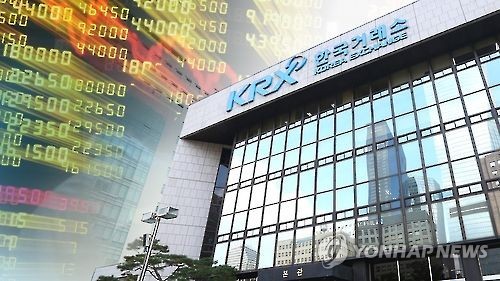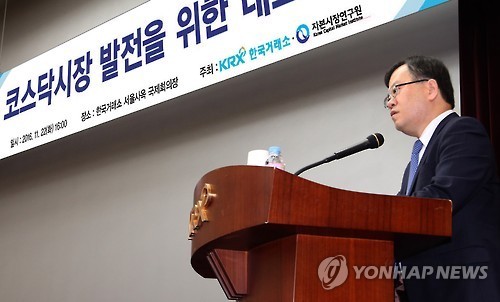With eased listing rules, Kosdaq aims to attract 10 new foreign firms in 2017
By Korea HeraldPublished : Dec. 25, 2016 - 16:12
South Korea’s tech-laden stock trading board will curtail regulatory barriers for overseas businesses next year, with the goal of listing at least 10 foreign firms deemed to have growth potential.

By opening its door to fledgling foreign firms that are still unprofitable but have promising technologies, staring January, the Kosdaq market will try to attract a variety of overseas businesses, with the aim of becoming a global capital market for tech firms.
“We are seeking a handful of measures to appeal to promising overseas businesses from different countries, in the hopes of making the Kosdaq a real global tech stock index,” Kim Jae-joon, president and CEO of the Kosdaq Market at Korea Exchange, the country’s stock boards operator, told The Korea Herald.
“We are seeking a handful of measures to appeal to promising overseas businesses from different countries, in the hopes of making the Kosdaq a real global tech stock index,” Kim Jae-joon, president and CEO of the Kosdaq Market at Korea Exchange, the country’s stock boards operator, told The Korea Herald.

The new measure is part of the Financial Services Commission’s plans to boost the country’s capital market amid the global phenomenon in which new firms rise as powerful industry leaders, such as Facebook and Tesla, helped by funds from capital markets.
Compared to Nasdaq in the US, it has been more difficult for startups to go public on the Kosdaq and get funds due to stiff regulations on capital requirements and profitability.
From Jan. 2, unprofitable overseas businesses will be able to apply for listing on the Kosdaq if they meet one of certain qualifications.
Applicants can have more than 500 billion won ($416 million) in market capitalization and have seen more than 3 billion won of annual sales in the previous year. The company’s on-year sales growth for the past two years can be 20 percent or higher, or they can have over 200 percent in price-to-book ratio after going public.
Until recently, companies with less than 2 billion won net profit have not been eligible for market listing.
Those unprofitable startups will also be given a grace period of five years of exemption from the operator’s management and delisting.
“Our goal is to list more than 10 foreign companies from different nations on the Kosdaq next year, including two or three US and one or two Vietnamese firms,” the Kosdaq president said.
The Kosdaq operator is already in talks with a Silicon Valley-based IT firm and New Jersey-based biotechnology firm for initial public listings in early 2017, according to Kim. It is also already eying companies in Indonesia and Japan.
In 2013, the Kosdaq saw the listing of its first non-Korean company, SBI Axes, a Japanese payment solution provider. There was no successful IPO of foreign businesses in the two years that followed.
This year, six Chinese firms and one American cosmetics business went public on the index, owing to the operator’s efforts to attract more foreign players. Since June, Korea Exchange has eased rules for foreign firms that are already listed on any stock market in the world, expanding the scope from those on nine major indexes.
“As an incentive for Kosdaq listing, we are considering connecting local venture capital firms with foreign firms,” Kim said.
While it is easier for companies to go public on the world’s largest tech-heavy Nasdaq, which has looser entry requirements, it is much tougher for them to secure liquidity due to stricter rules to maintain their listings.
Out of seven Korean businesses that went public on the US index, six were delisted, according to Kim.
“The total cost of maintaining a listing on the Kosdaq is about one-eighth that of the Nasdaq,” Kim said. “Conditions will be better for firms to raise capital due to active transactions.”
Meanwhile, responsibilities of the largest shareholders of incoming foreign players, IPO overseers and accountants will be enhanced to reduce retail investors’ risks, according to the FSC’s plans.
An IPO overseer that has recommended an inappropriate company for the market in the past three years will be barred from making recommendations for one year.
Overseers will also be required to reveal reports gauging the growth potential of startups to all investors.
To minimize retail investors’ investment risks, the regulator decided to give them put-back options for six months after listing, which would enable a refund of up to 90 percent of the investment at IPO prices.
By Song Su-hyun (song@heraldcorp.com)
-
Articles by Korea Herald


![[AtoZ into Korean mind] Humor in Korea: Navigating the line between what's funny and not](http://res.heraldm.com/phpwas/restmb_idxmake.php?idx=644&simg=/content/image/2024/04/22/20240422050642_0.jpg&u=)


![[Exclusive] Korean military set to ban iPhones over 'security' concerns](http://res.heraldm.com/phpwas/restmb_idxmake.php?idx=644&simg=/content/image/2024/04/23/20240423050599_0.jpg&u=20240423183955)
![[Herald Interview] Why Toss invited hackers to penetrate its system](http://res.heraldm.com/phpwas/restmb_idxmake.php?idx=644&simg=/content/image/2024/04/22/20240422050569_0.jpg&u=20240422150649)
![[Graphic News] 77% of young Koreans still financially dependent](http://res.heraldm.com/phpwas/restmb_idxmake.php?idx=644&simg=/content/image/2024/04/22/20240422050762_0.gif&u=)







![[Exclusive] Korean military to ban iPhones over security issues](http://res.heraldm.com/phpwas/restmb_idxmake.php?idx=652&simg=/content/image/2024/04/23/20240423050599_0.jpg&u=20240423183955)



![[Today’s K-pop] Ateez confirms US tour details](http://res.heraldm.com/phpwas/restmb_idxmake.php?idx=642&simg=/content/image/2024/04/23/20240423050700_0.jpg&u=)